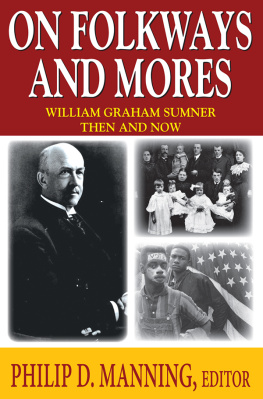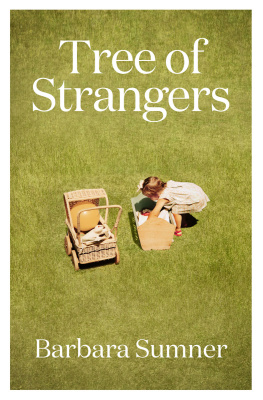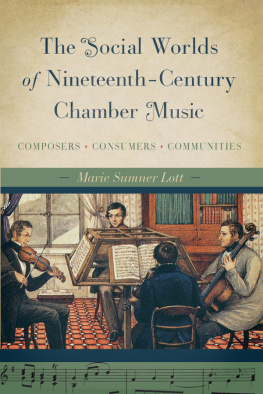William Graham Sumner - What Social Classes Owe Each Other
Here you can read online William Graham Sumner - What Social Classes Owe Each Other full text of the book (entire story) in english for free. Download pdf and epub, get meaning, cover and reviews about this ebook. year: 1974, publisher: The Caxton Printers, Ltd, genre: Politics. Description of the work, (preface) as well as reviews are available. Best literature library LitArk.com created for fans of good reading and offers a wide selection of genres:
Romance novel
Science fiction
Adventure
Detective
Science
History
Home and family
Prose
Art
Politics
Computer
Non-fiction
Religion
Business
Children
Humor
Choose a favorite category and find really read worthwhile books. Enjoy immersion in the world of imagination, feel the emotions of the characters or learn something new for yourself, make an fascinating discovery.
- Book:What Social Classes Owe Each Other
- Author:
- Publisher:The Caxton Printers, Ltd
- Genre:
- Year:1974
- Rating:3 / 5
- Favourites:Add to favourites
- Your mark:
- 60
- 1
- 2
- 3
- 4
- 5
What Social Classes Owe Each Other: summary, description and annotation
We offer to read an annotation, description, summary or preface (depends on what the author of the book "What Social Classes Owe Each Other" wrote himself). If you haven't found the necessary information about the book — write in the comments, we will try to find it.
What Social Classes Owe Each Other — read online for free the complete book (whole text) full work
Below is the text of the book, divided by pages. System saving the place of the last page read, allows you to conveniently read the book "What Social Classes Owe Each Other" online for free, without having to search again every time where you left off. Put a bookmark, and you can go to the page where you finished reading at any time.
Font size:
Interval:
Bookmark:

WHAT SOCIAL CLASSES
OWE TO EACH OTHER
By
WILLIAM GRAHAM SUMNER


THE CAXTON PRINTERS, LTD.
CALDWELL, IDAHO
1974

First published by Harper & Brothers, 1883
Published by Yale University Press, 1925
Second printing, Yale University Press, 1934
Published 1947 by The Pamphleteers, Inc., of Los Angeles
First Caxton printing, Feb. 1952
Second Caxton printing, Nov. 1954
Third Caxton printing, Sept. 1961
Fourth Caxton printing, Dec. 1963
Fifth Caxton printing, Oct. 1966
Sixth Caxton printing, Sept. 1970
Seventh Caxton printing, May 1974
Printed and bound in the United States of America
by The CAXTON PRINTERS, Ltd., Caldwell, Idaho
123768
CHAPTER
WRITTEN more than fifty years agoin 1883WHAT SOCIAL CLASSES OWE TO EACH OTHER is even more pertinent today than at the time of its first publication. Then the arguments and movements for penalizing the thrifty, energetic, and competent by placing upon them more and more of the burdens of the thriftless, lazy and incompetent, were just beginning to make headway in our country, wherein these social reforms now all but dominate political and so-called social thinking.
Among the great nations of the world today, only the United States of America champions the rights of the individual as against the state and organized pressure groups, and our faith has been dangerously weakenedwatered down by a blind and essentially false and cruel sentimentalism.
In Social Classes Sumner defined and emphasized the basically important role in our social and economic development played by The Forgotten Man. The misappropriation of this title and its application to a character the exact opposite of the one for whom Sumner invented the phrase is, unfortunately, but typical of the perversion of words and phrases indulged in by our present-day liberals in their attempt to further their revolution by diverting the loyalties of individualists to collectivist theories and beliefs.
How often have you said: If only someone had the vision to see and the courage and ability to state the truth about these false theories which today are attracting our youth and confusing well-meaning people everywhere! Well, here is the answer to your prayerthe everlasting truth upon the greatest of issues in social science stated for you by the master of them all in this field. If this edition calls this great work to the attention of any of you for the first time, that alone will amply justify its republication. To those of you who have read it before, we commend it anew as the most up-to-date and best discussion you can find anywhere of the most important questions of these critical days.
WILLIAM C. MULLENDORE
Los Angeles, California
November 15, 1951
OWE TO EACH OTHER
________________
WE are told every day that great social problems stand before us and demand a solution, and we are assailed by oracles, threats, and warnings in reference to those problems. There is a school of writers who are playing quite a rle as the heralds of the coming duty and the coming woe. They assume to speak for a large, but vague and undefined, constituency, who set the task, exact a fulfillment, and threaten punishment for default. The task or problem is not specifically defined. Part of the task which devolves on those who are subject to the duty is to define the problem. They are told only that something is the matter: that it behooves them to find out what it is, and how to correct it, and then to work out the cure. All this is more or less truculently set forth.
After reading and listening to a great deal of this sort of assertion I find that the question forms itself with more and more distinctness in my mind: Who are those who assume to put hard questions to other people and to demand a solution of them? How did they acquire the right to demand that others should solve their world-problems for them? Who are they who are held to consider and solve all questions, and how did they fall under this duty?
So far as I can find out what the classes are who are respectively endowed with the rights and duties of posing and solving social problems, they are as follows: Those who are bound to solve the problems are the rich, comfortable, prosperous, virtuous, respectable, educated, and healthy; those whose right it is to set the problems are those who have been less fortunate or less successful in the struggle for existence. The problem itself seems to be, How shall the latter be made as comfortable as the former? To solve this problem, and make us all equally well off, is assumed to be the duty of the former class; the penalty, if they fail of this, is to be bloodshed and destruction. If they cannot make everybody else as well off as themselves, they are to be brought down to the same misery as others.
During the last ten years I have read a great many books and articles, especially by German writers, in which an attempt has been made to set up the State as an entity having conscience, power, and will sublimated above human limitations, and as constituting a tutelary genius over us all. I have never been able to find in history or experience anything to fit this concept. I once lived in Germany for two years, but I certainly saw nothing of it there then. Whether the State which Bismarck is moulding will fit the notion is at best a matter of faith and hope. My notion of the State has dwindled with growing experience of life. As an abstraction, the State is to me only All-of-us. In practicethat is, when it exercises will or adopts a line of actionit is only a little group of men chosen in a very haphazard way by the majority of us to perform certain services for all of us. The majority do not go about their selection very rationally, and they are almost always disappointed by the results of their own operation. Hence the State, instead of offering resources of wisdom, right reason, and pure moral sense beyond what the average of us possess, generally offers much less of all those things. Furthermore, it often turns out in practice that the State is not even the known and accredited servants of the State, but, as has been well said, is only some obscure clerk, hidden in the recesses of a Government bureau, into whose power the chance has fallen for the moment to pull one of the stops which control the Government machine. In former days it often happened that The State was a barber, a fiddler, or a bad woman. In our day it often happens that the State is a little functionary on whom a big functionary is forced to depend.
I cannot see the sense of spending time to read and write observations, such as I find in the writings of many men of great attainments and of great influence, of which the following might be a general type: If the statesmen could attain to the requisite knowledge and wisdom, it is conceivable that the State might perform important regulative functions in the production and distribution of wealth, against which no positive and sweeping theoretical objection could be made from the side of economic science; but statesmen never can acquire the requisite knowledge and wisdom. To me this seems a mere waste of words. The inadequacy of the State to regulative tasks is agreed upon, as a matter of fact, by all. Why, then, bring State regulation into the discussion simply in order to throw it out again? The whole subject ought to be discussed and settled aside from the hypothesis of State regulation.
Font size:
Interval:
Bookmark:
Similar books «What Social Classes Owe Each Other»
Look at similar books to What Social Classes Owe Each Other. We have selected literature similar in name and meaning in the hope of providing readers with more options to find new, interesting, not yet read works.
Discussion, reviews of the book What Social Classes Owe Each Other and just readers' own opinions. Leave your comments, write what you think about the work, its meaning or the main characters. Specify what exactly you liked and what you didn't like, and why you think so.













